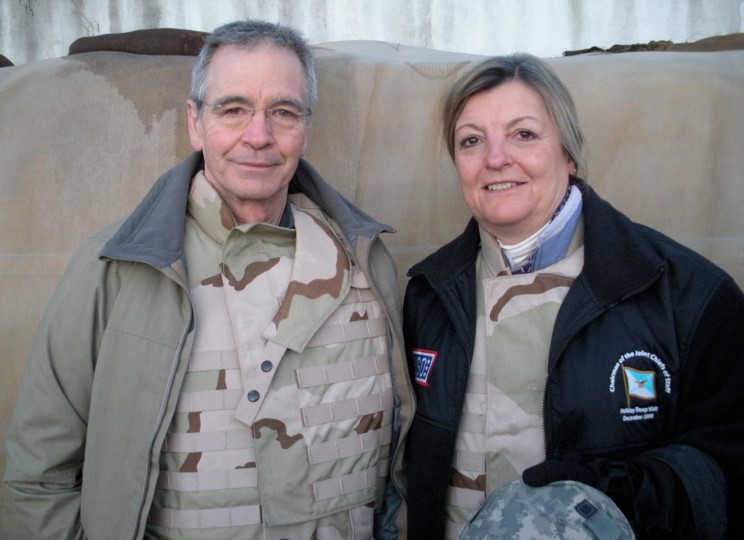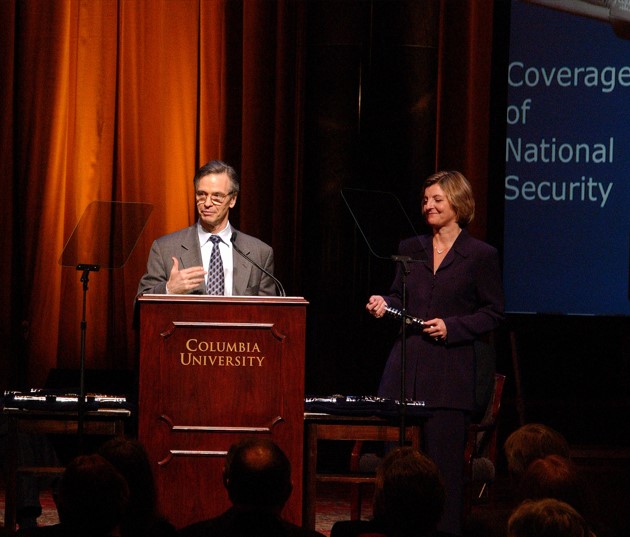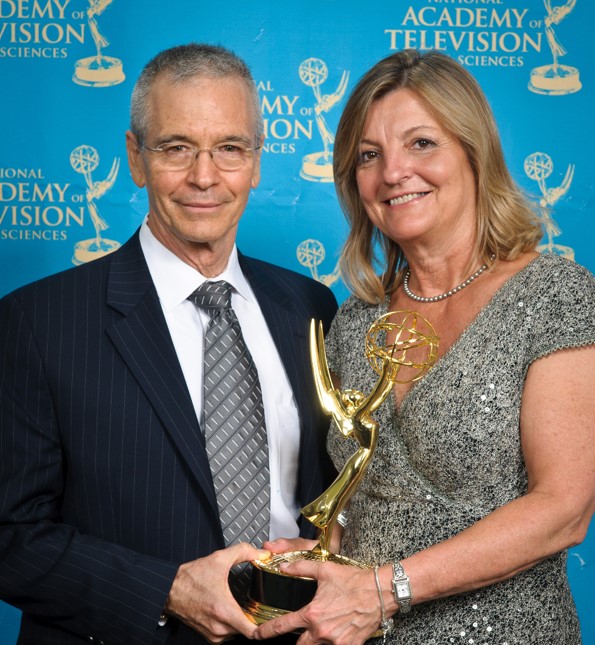Editor’s Note:
Below is the sixth installment of TVNewser’s The Producer I Can’t Live Without series, where prominent TV newsers and their longtime producers talk about their successful partnerships.
In this segment, CBS News national security correspondent David Martin is recognized as celebrating his 40th year at CBS News. He’s also being inducted into the National Television Academy of Television Arts & Sciences’ Gold Circle honor society this evening after the 44th Annual News & Documentary Emmy awards in New York.
To mark both occasions, TVNewser hopped on a Zoom call with Martin and his longtime producer Mary Walsh to learn more about Martin’s career and the duo’s working partnership, which started in 1991.
Walsh is a member of The Daily Texan Hall of Fame and a University of Texas graduate, where she was editor of the Daily Texan in 1976-77. Her work includes producing stories for the CBS Evening News, CBS Sunday Morning and 60 Minutes. She has been assigned to the Pentagon since 1993 and has covered the American military all over the United States and in many parts of the world, including Iraq, Afghanistan, Kuwait, Turkey, Somalia, Bosnia, Haiti, Germany, the Philippines and Korea. As CBS News producer in Tokyo from 1989 to 1993, Walsh was responsible for news coverage in all parts of Asia—with focus on China, Korea, Burma, Thailand, Vietnam, Cambodia and Japan.
During the Newser conversation, Walsh called Martin “the best Pentagon reporter of a generation, if not all time.” Martin said he’s very lucky Walsh has remained with him on the Pentagon beat over the years, especially considering “several bigger-name correspondents have tried to recruit her away.”
While it’s clear that they admire one another, they’ve also been known to butt heads on occasion. But when you’re working side-by-side with someone for 32 years, that’s to be expected, no?
Below is TVNewser’s conversation with Martin and Walsh, lightly edited for clarity purposes.
TVNewser: Talk about how you two ended up working together.
Walsh: It was 1991, so last century. [Former Massachusetts] Senator John Kerry and [former New Jersey] Senator Bob Smith were going to Vietnam to speak to the Vietnamese about the Americans Missing in Action from that war. I was based at the CBS bureau in Tokyo and David was coming over to cover that trip, which was a big deal because the United States did not have diplomatic relations with Vietnam after the end of that war, and the MIA [Missing in Action] issue was huge in the United States.
As I said, I was based in Tokyo covering news all over Asia – military coups in the Philippines, earthquakes, typhoons the eruption of Mount Pinatubo. I was in the field a lot, and I was handling a lot of tough situations in the field.
Martin: I led a very sheltered life at the Pentagon, and when I got to go to Vietnam, I was really impressed with the way she handled all the difficulties of working there. Not only were there no diplomatic relations, there was also no trust. We’d fought this horrible war, and the Vietnamese people had suffered much more than the Americans had. We were not on friendly ground.
This was a country still just trying to keep it together, and they required among other things that everything be paid upfront in cash. Before they would accept the cash, they would run it through a counterfeit machine. So, Mary carried around this big pouch of money and we’d be there trying to hit our satellite time. She’s counting out the money in order to pay the bill and they’re running her through the counterfeit machine and the seconds are ticking down. After I realized she could do that without breaking a sweat, I stopped worrying about making the hit time and started really enjoying myself.
What’s the secret, or secrets to your successful partnership over the years?
Walsh: Back in that day, David’s nickname was: “Run Silent, Run Deep.” He really likes to work alone. He works quietly; because he’s on the phone talking to sources, and he’s always dialing in deeper and deeper and deeper into whatever story he’s working on.
I learned quickly that he did not want a producer calling him every five minutes with whatever latest small detail had cropped up. I learned to leave him alone, and I think part of what how that worked out was that I drew on all the strength of my side of the production team, and he did his side, and we learned to trust each other totally. Especially when there’s a breaking news story, it gives you so much comfort and confidence because I know that he’s doing his thing, and he knows that I’m summoning all my superpowers to pull it off on my side. And we sort of meet in the middle.
David always gets the first script; he always writes the first script. He’s a very fast, very clean writer on breaking news stories. On the in-depth longer stories, what we do is we put on headphones, we go to the phone, and we do like what I really call almost a “mind meld,” where we go through sentence by sentence, and we restructure. Sometimes we’ll even be almost calling out words, “blue skying” words, because television writing is so exact, and so tight. We could spend hours and hours on the script.
Martin: One other thing you must do is put in the reps. You have got to do so many pieces, hundreds of pieces. You get to know each other’s M.O. without even thinking about it. You obviously can’t put in the reps if you don’t get along. However, if you hit it off, then you can put in the reps, and basically, it’s a question of staying together by choice.
She won’t tell you this, but several bigger-name correspondents have tried to recruit her away, and she has stuck with the beat.
Walsh: He’s the best Pentagon reporter of a generation, if not of all time. I’m not going to walk away.
I had a lot of interest in the military, which came from my time in the field. I covered the U.S. military in Asia. I landed in Somalia, with the Marines. And I started calling David—because this is when I still was based in Tokyo—I started calling David on the Somalia operation, sharing observations about the military mission. I don’t think he realized that I was sort of lobbying him to bring me on as his producer. But I was ready to come out of the field and move to D.C., and I was trying to impress him that I knew at least a little bit about the military.
Martin: One other part of working together is challenging each other; not just agreeing on a script but arguing back and forth. It’s not easy to take criticism, and there was a time when she would say, “hey, this, this doesn’t work,” and I would get offended. But hundreds and hundreds of times, you start to realize when she says this doesn’t work, that means it doesn’t work, and so you both have to make it better. That’s what she was talking about with the “mind meld” and going to the headphones.
Other anchors and correspondents we’ve spoken with say a good deal of their success comes from the producer anticipating what the anchor/correspondent might want or need. Do you two feel that anticipation is essential to a strong correspondent-producer partnership?
Walsh: We were talking about a story that we did in San Antonio, with a family and the logistical problems that were going on in that situation, were so paramount; but David wasn’t even aware of them, because I was already taking care of them. That’s anticipation. I think the other part of anticipation is just trying to figure out what the story is, and trying to figure out who the right people are in interview because you have limited time and resources at times.
Martin: Well, what she’s saying is the correspondent is clueless! (laughter) When it comes to the logistics of a shoot, I am clueless. If I had to set up a shoot, we would, we would never get it.
When you said, “be sensitive to the other person’s needs,” I’m in charge of the information, she’s in charge at the television. The information doesn’t always lend itself to being shown on television. You don’t have the pictures to go with a story. I think that was over time one of the big learning experiences for me, you know, if I, if I could just say, “CBS News has learned blah, blah, blah…” The rest was her problem. Now, I don’t approach it that that way. If I am consciously thinking about “how are you going to turn that sentence into television?” I’m afraid to ask her in front of you whether I’ve gotten any better! (laughter)
Walsh: You have.
Forty and 41 years at CBS News, respectively. Doesn’t matter the field, that’s extraordinary amount of time working at the same place. In what ways have your respective jobs changed since the early ‘80s, and in what ways have they remained the same?
Walsh: I think that the systems by which we gather information and gather material for television have changed, have been transformed.
An example is the recent crash of the F-35. You can bring in material from Ukraine, you can bring material in from around the world, but the basic fact-gathering, and the writing and the shaping of narrative is the same as far as I’m concerned. It’s the human voice, the human face that drives the story of why people care about it, and what’s happening. I think the platforms have changed, but the shaping of narrative I think is the same.
Martin: I don’t really do anything different today than I did in 1983. I come into the Pentagon, and I walk around the Pentagon. There are always some offices you just go to out of habit, but it really is the people you run into while you’re walking around the Pentagon.
I would say 80 to 90% of the good stories you get just come from walking around the Pentagon and just being in the ambiance of the place. So that hasn’t changed, really, at all. Although I do find that Twitter can tweet faster than I can walk. Sometimes news will get out over Twitter before I can get back to my booth.
In terms of sitting down and writing a script, I do it on my computer now. I used to dictate the script, but it’s still the very same process. I think we probably have access to more video now, because of cell phones.
Walsh: Also, the transcripts come a lot faster.
Martin: Oh yeah, that’s a biggie. The automatic transcripts. You can turn a large interview around in a very short time.
Walsh: The way David works, he does what’s called “selects,” where you select what you want to use from a transcript. He really likes to just type it out, look at the transcript and then make a separate selects. We work differently that way. I like to have the full transcript and go through it. We kind of meet in the middle on that, because sometimes he’ll have made his selects and I’ll have seen something else in the interview. I like to work with it, whole cloth.
I like to say that David walks the Pentagon like a cop on a beat. It’s something I’ve learned over the years covering it – that building almost has its own pulse. You know when news is breaking. Your “Spidey Sense.” You know when something’s going on. David strategically walks the Pentagon. He runs into people by accident on purpose.
Martin: It’s very sophisticated (laughter).
I’m aware there are a lot to choose from, but is there a specific story the two of you have worked on together that stands out?
Martin: To me, one of the most important stories we did was about the Battle of Wanat, in Afghanistan.
Wanat was an outpost which came within an eyelash of being overrun by the enemy. It just immediately begged all these questions about, “what in the hell are American soldiers doing in that, that valley to begin with?” And “where in the hell are the reinforcements?” Everybody was asking those questions. We got access to home video of the soldiers before the battle started, just being goofy 19- and 20-year-olds. And then we had the gun camera tape, and the audio of the Apache helicopters that finally came in to beat back the enemy.
When you took the human faces of those kids, and then you put them in the sound, and the pictures of that battle – it was just very powerful television. Better yet, the CBS Evening News recognized it and treated it as a very important story.
Walsh: That story ran six minutes long. Rick Kaplan, who was the executive producer of the CBS Evening News at the time, led the broadcast with a six-minute piece.
I want to point out that the video of the soldiers was as they were creating their defenses at the base. They weren’t being goofy; they were trying to build their defenses on that base and it really showed how unprotected the base was.
Now A.J., if you wanted to know how we challenge each other, you’re witnessing a moment of it! (laughter)
But the key is that human face and not at trying to break the news cycle. [The Battle of] Wanat was a huge story when it happened in 2008 because it was one of the highest number of losses in a battle in Afghanistan. But, we went back a year later.
Another time that we did that was a year after the terrorist attack at the airport in Brussels, where an American family had been grievously injured. We kept patiently pinging the representatives for that family and saying, “when they’re ready, we want to talk to you.”
The battle of Wanat coverage won an Emmy, and this story on the Martinez family in San Antonio also did.
Martin: That [Martinez family] story was almost more powerful than I could stand. We spent the day with the family. The father was going through his physical rehab and the teenage daughter was going through her physical rehab.
Walsh: Remember how badly burned his son was?
Martin: He had burns on his hands.
Then, we sat down to do this interview with the daughter, who was this incredibly articulate teenager. She was telling us about lying on the floor with her mother dying at her side and squeezing her father’s arm and telling him, “Don’t you dare die on me too.” That remains the most memorable interview I’ve ever done with a teenager.
Walsh: That story, called Aftermath, also won an Emmy. After we collected the statue, David put it in his in a box and sent it to the Martinez family, where they have it, as they hold their mother in loving tribute.
The name of this feature is The Producer I Can’t Live Without. David, can you pinpoint a time when Mary saved you over your many years working together? It can be on air or behind-the-scenes.
Martin: One thing she does, which you’ll never see on the air is to keep me abreast of what’s going on at CBS. Because I’m at the Pentagon, I’m clueless, I really am. I don’t hear any of the gossip.
I don’t know what power struggle is going on. There are people who want your job. I mean, it’s a great job to have, right? Mary will see that coming along before I do, and she will slap me about the head a couple times and get me pointed in the right direction.
Walsh: I think partially, he’s just not remembering the time that he showed up to do an on-camera with an orange jacket and a pink hat.
Martin: I have one. We were in Haiti. This was in the 90’s. Haiti was, as always, chaotic. We were trying to get to the airport to get out of there and were in a gridlock traffic jam. The driver is leaning on his horn, but nothing’s happening. She [Mary] gets out of the car and starts directing traffic. She undid the traffic jam, and we made our plane. If she hadn’t, we still might still be in Haiti!
Walsh: There are some Haitians who are still talking about the sight of this crazy woman getting out and directing traffic! (laughter)